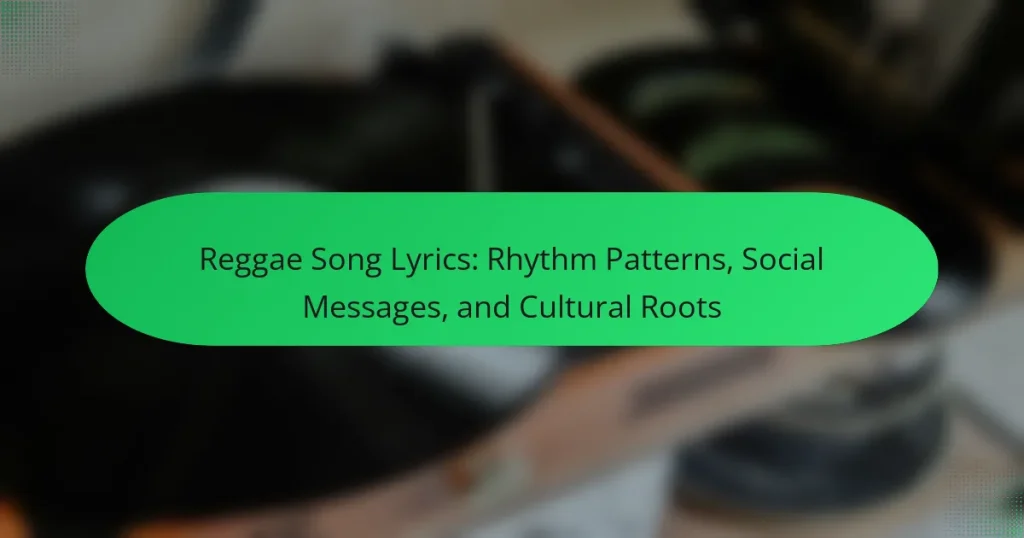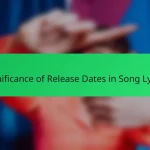Reggae song lyrics are the textual components of reggae music, characterized by rhythmic patterns that complement the genre’s distinctive beat. These lyrics often convey themes of social justice, love, and resistance, reflecting the cultural roots of Jamaica, where reggae originated. Notable artists, such as Bob Marley, utilized their lyrics to address political issues and promote messages of unity, empowerment, and awareness of social struggles faced by marginalized communities. The analysis of reggae lyrics reveals insights into cultural identity and emotional expression, making them a powerful medium for social commentary and mobilization. Overall, reggae lyrics serve as a vital tool for connecting with listeners and advocating for change.
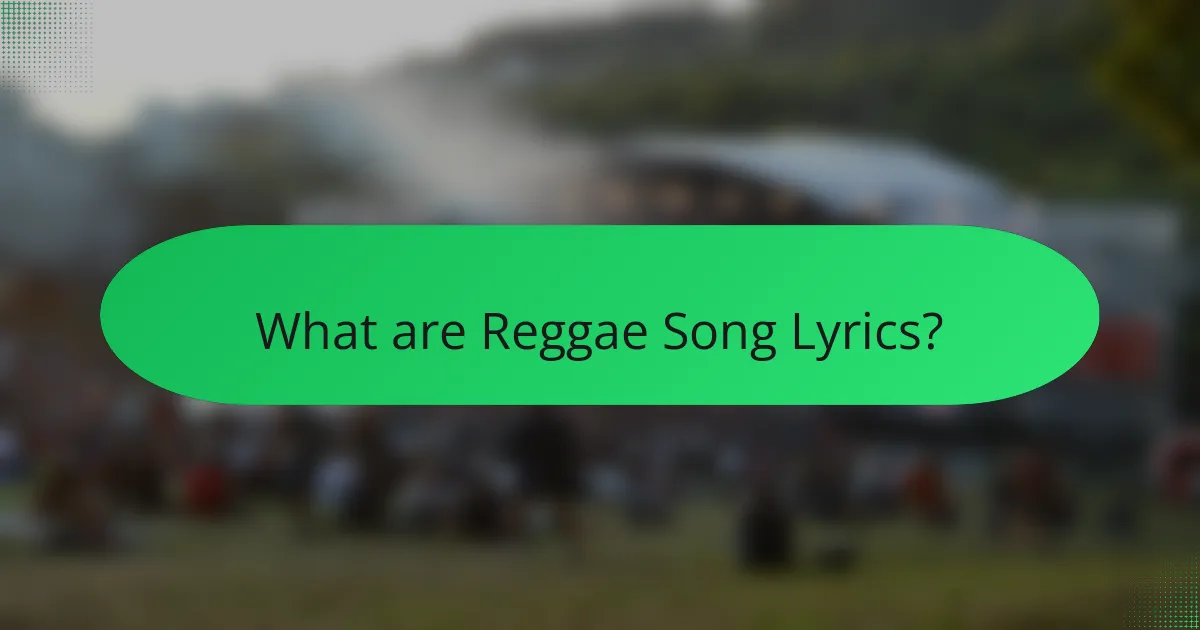
What are Reggae Song Lyrics?
Reggae song lyrics are the textual components of reggae music. They often convey themes of social justice, love, and [censured]. Reggae lyrics typically reflect the cultural roots of Jamaica, where the genre originated. The lyrics are characterized by their rhythmic patterns that complement the music’s distinctive beat. Many reggae songs address political issues and promote messages of unity and resistance. Notable artists like Bob Marley used lyrics to spread messages of hope and empowerment. The lyrical content is essential for expressing the genre’s identity and connecting with listeners.
How do Reggae Song Lyrics reflect cultural identity?
Reggae song lyrics reflect cultural identity by expressing themes of social justice, resistance, and community. These lyrics often address issues such as poverty, oppression, and the struggles faced by marginalized groups. The genre originated in Jamaica, rooted in the island’s history and socio-political context. Artists like Bob Marley used their music to advocate for change and unite people. The use of Patois in lyrics also emphasizes Jamaican cultural heritage. Additionally, reggae incorporates elements of Rastafarian beliefs, which further shape its cultural narrative. This connection to identity is evident in songs that celebrate African heritage and promote unity. Through these expressions, reggae serves as a voice for cultural pride and awareness.
What themes are commonly found in Reggae Song Lyrics?
Common themes in reggae song lyrics include social justice, love, and [censured]. Social justice is a prominent theme, addressing issues like inequality and oppression. Many reggae songs advocate for human rights and speak against violence. Love is another prevalent theme, often expressed in romantic contexts or as a broader message of unity. [censured] frequently appears, reflecting Rastafarian beliefs and a connection to a higher power. Additionally, themes of resistance and empowerment are common, emphasizing resilience in the face of adversity. These themes resonate deeply within the cultural and historical context of reggae music.
How do Reggae Song Lyrics convey social messages?
Reggae song lyrics convey social messages by addressing political, social, and economic issues. These lyrics often reflect the struggles of marginalized communities. Themes include resistance against oppression, social justice, and unity. Artists like Bob Marley used their platform to highlight inequality and promote peace. For example, Marley’s song “Get Up, Stand Up” calls for activism against injustice. The use of colloquial language makes the messages relatable to everyday experiences. This accessibility allows listeners to connect deeply with the themes. Additionally, reggae’s rhythmic patterns enhance the emotional impact of the lyrics. Overall, reggae lyrics serve as a powerful medium for social commentary.
What role do rhythm patterns play in Reggae Song Lyrics?
Rhythm patterns are essential in Reggae song lyrics as they create a distinct musical identity. These patterns often emphasize the offbeat, contributing to the genre’s signature sound. The use of syncopation in lyrics enhances the emotional impact of the message. Reggae rhythms support storytelling, making the lyrics more engaging. They also reflect cultural roots, connecting listeners to the genre’s historical context. Additionally, rhythm patterns can influence the mood and energy of a song. For example, upbeat rhythms can convey joy, while slower patterns may evoke reflection. Overall, rhythm patterns are integral to the expression and reception of Reggae music.
What are the key characteristics of Reggae rhythm patterns?
Reggae rhythm patterns are characterized by their distinctive offbeat accents and syncopation. The guitar and keyboard typically emphasize the second and fourth beats, creating a “one drop” feel. Bass lines in reggae often feature a repetitive, melodic style that complements the drums. The snare drum plays a crucial role, usually striking on the third beat of the measure. This creates a laid-back groove that is central to reggae music. Additionally, reggae often incorporates polyrhythms, blending different rhythmic patterns. The overall tempo of reggae is generally moderate, allowing for a relaxed listening experience. These characteristics contribute to reggae’s unique sound and cultural identity.
How do rhythm patterns enhance the emotional impact of Reggae Song Lyrics?
Rhythm patterns enhance the emotional impact of Reggae song lyrics by creating a unique groove that resonates with listeners. These patterns often incorporate offbeat accents, which evoke feelings of relaxation and joy. The syncopation found in Reggae rhythms can also reflect the struggles and resilience of the community. This connection to cultural roots amplifies the message within the lyrics. For instance, the use of the one drop rhythm creates a sense of unity and togetherness. Research indicates that rhythmic elements can influence emotional responses significantly. A study by Thaut et al. (1999) shows that rhythm can enhance emotional recognition in music. Therefore, rhythm patterns in Reggae not only support the lyrical content but also deepen the emotional experience for the audience.
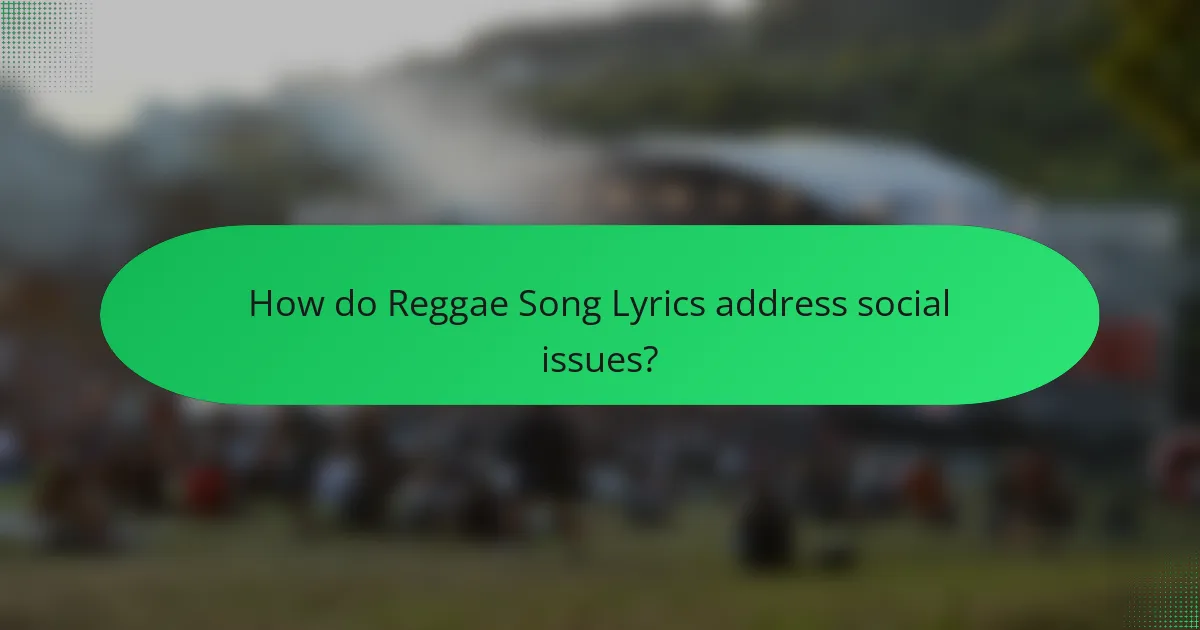
How do Reggae Song Lyrics address social issues?
Reggae song lyrics address social issues by highlighting themes of resistance, inequality, and empowerment. These lyrics often reflect the struggles faced by marginalized communities. For example, many songs tackle topics such as poverty, violence, and political oppression. Artists like Bob Marley used their music to promote messages of peace and social justice. The lyrics serve as a voice for the voiceless, advocating for change and awareness. Reggae has roots in the socio-political landscape of Jamaica, making its messages deeply relevant. Songs like “Get Up, Stand Up” exemplify this commitment to social activism. Overall, reggae lyrics function as a powerful tool for social commentary and mobilization.
What social messages are prevalent in Reggae music?
Reggae music often conveys social messages of resistance, unity, and empowerment. These themes reflect the struggles against oppression and inequality. Many songs address issues like poverty, racism, and social injustice. Artists like Bob Marley emphasized messages of peace and love. The genre promotes cultural identity and pride. Reggae also supports movements for political change. Its roots are deeply connected to the Rastafarian movement, advocating for social justice. The lyrics serve as a voice for marginalized communities.
How do Reggae Song Lyrics promote social justice?
Reggae song lyrics promote social justice by addressing themes of inequality and oppression. They often highlight the struggles faced by marginalized communities. Artists like Bob Marley used their music to advocate for civil rights and social change. Lyrics frequently reference historical injustices, such as colonialism and racism. This evokes awareness and encourages activism among listeners. The genre’s roots in Rastafarian culture further emphasize messages of unity and resistance. Reggae songs serve as a platform for voicing dissent against social injustices. They inspire movements and foster solidarity among oppressed groups. This combination of powerful lyrics and cultural significance makes reggae a vital tool for promoting social justice.
What historical events influence the social messages in Reggae Song Lyrics?
Historical events such as colonialism, the Rastafarian movement, and the civil rights struggle significantly influence the social messages in reggae song lyrics. Colonialism in Jamaica created a legacy of oppression and resistance, which reggae artists often reflect in their lyrics. The Rastafarian movement, emerging in the 1930s, promotes themes of social justice, [censured], and African identity, shaping the lyrical content of many reggae songs. The civil rights struggle in the 1960s and 1970s also inspired reggae musicians to address issues of inequality, freedom, and human rights. Notable songs like “Get Up, Stand Up” by Bob Marley exemplify these influences, advocating for social change and empowerment. These historical contexts provide a framework for understanding the messages embedded in reggae music.
Why are cultural roots important in Reggae Song Lyrics?
Cultural roots are important in Reggae song lyrics because they provide a deep connection to identity and heritage. Reggae music often reflects the struggles and triumphs of the Jamaican people. This genre draws heavily from African traditions, Rastafarian beliefs, and social issues. Lyrics frequently address themes of resistance, unity, and [censured]. The incorporation of cultural references helps to convey powerful messages. For instance, the use of local dialect and imagery resonates with listeners. This connection fosters a sense of belonging and pride among audiences. Thus, cultural roots enrich the narrative and emotional depth of Reggae music.
How do cultural roots shape the themes in Reggae Song Lyrics?
Cultural roots significantly shape the themes in Reggae song lyrics. Reggae music originated in Jamaica, influenced by the island’s history and social struggles. Themes often reflect the experiences of marginalized communities. Lyrics address issues such as oppression, poverty, and resistance. Rastafarian beliefs also play a critical role in thematic development. [censured] and connection to African heritage are prevalent in many songs. For example, Bob Marley’s lyrics frequently highlight social justice and unity. This cultural context provides depth and meaning to the music.
What influences from Rastafarian culture are evident in Reggae Song Lyrics?
Rastafarian culture significantly influences Reggae song lyrics. This influence is evident in themes of [censured] and resistance. Lyrics often reference Jah, the Rastafarian name for God. They also emphasize African heritage and identity. Social justice and anti-colonial sentiments are prevalent in the lyrics. The use of Patois, a Creole language, reflects cultural authenticity. Additionally, imagery of nature and the struggle against oppression is common. Songs frequently celebrate community and unity among people. These elements together create a rich tapestry of Rastafarian beliefs within Reggae music.
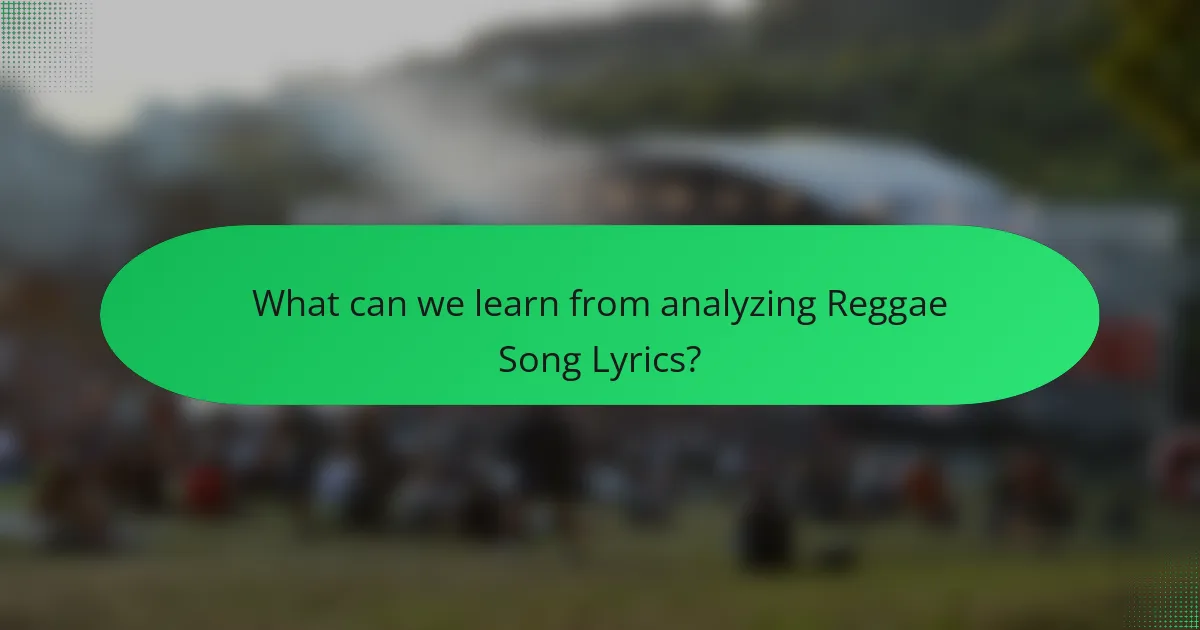
What can we learn from analyzing Reggae Song Lyrics?
Analyzing Reggae song lyrics reveals insights into social issues, cultural identity, and emotional expression. These lyrics often address themes such as resistance, love, and [censured]. For example, many songs highlight struggles against oppression and inequality. This reflects the historical context of reggae’s origins in Jamaica during the 1960s. Additionally, the use of metaphors and storytelling in lyrics enhances understanding of cultural narratives. Reggae lyrics also showcase the rhythm patterns unique to the genre, influencing musical composition. Overall, they serve as a powerful medium for conveying messages and connecting with listeners on a deeper level.
How can understanding Reggae Song Lyrics enhance our appreciation of the genre?
Understanding Reggae song lyrics enhances our appreciation of the genre by revealing its cultural and social significance. Reggae lyrics often address themes like resistance, love, and social justice. This connection to historical and political contexts deepens listeners’ emotional engagement. For example, Bob Marley’s lyrics frequently reflect the struggles of the Jamaican people. Analyzing these lyrics allows fans to recognize the genre’s roots in Rastafarian beliefs and African heritage. Engaging with the messages fosters a greater respect for the artists and their intentions. This understanding transforms casual listening into a more meaningful experience. Ultimately, it enriches the listener’s connection to reggae music and its legacy.
What are some common misconceptions about Reggae Song Lyrics?
Common misconceptions about reggae song lyrics include the belief that they primarily focus on partying and relaxation. In reality, many reggae lyrics address serious social issues, including poverty, inequality, and political unrest. Another misconception is that reggae music is solely about Rastafarian themes. While Rastafarianism plays a significant role, reggae encompasses a wide range of topics. Additionally, some people assume that all reggae songs promote a laid-back lifestyle. Many lyrics convey messages of empowerment and resistance. Misunderstandings about the language used in reggae also exist. Some listeners overlook the depth of Patois, the Jamaican Creole used, which carries rich cultural significance. Overall, reggae lyrics often reflect complex narratives that go beyond surface-level interpretations.
What tips can help in writing impactful Reggae Song Lyrics?
To write impactful Reggae song lyrics, focus on strong storytelling and cultural themes. Reggae often addresses social issues, so incorporate messages about love, unity, or resistance. Use vivid imagery to create relatable and emotional connections. Maintain a rhythmic flow that complements the music. Keep the language simple yet powerful for accessibility. Incorporate local dialects or slang to resonate with the audience. Use repetition effectively to emphasize key messages and create memorable hooks. Draw inspiration from personal experiences or historical events to add authenticity. These elements are essential for crafting lyrics that resonate in the Reggae genre.
How can one effectively incorporate rhythm and social messages in Reggae Song Lyrics?
To effectively incorporate rhythm and social messages in reggae song lyrics, one should focus on the unique rhythmic patterns characteristic of reggae music. Reggae typically features a strong offbeat rhythm, often emphasizing the second and fourth beats in a measure. This rhythmic foundation allows for a natural flow of lyrics that can convey powerful social messages.
Incorporating social messages requires clear and relatable themes that resonate with listeners. Lyrics should address issues such as social justice, inequality, and community struggles, which are prevalent in reggae’s history. The use of vivid imagery and storytelling can enhance the emotional impact of these messages.
Additionally, utilizing repetition in lyrics can reinforce key themes and make them memorable. The combination of catchy hooks and meaningful verses can engage the audience effectively. Historical examples include Bob Marley’s “Get Up, Stand Up,” which blends rhythmic elements with a strong social message about fighting for rights.
In summary, a successful integration of rhythm and social messages in reggae lyrics involves understanding the genre’s rhythmic structure, addressing relevant social issues, and using lyrical techniques like imagery and repetition.
Reggae song lyrics serve as a fundamental component of reggae music, reflecting themes of social justice, love, and [censured] rooted in Jamaican culture. The article explores how these lyrics convey social messages, address historical issues, and embody cultural identity, particularly through the influence of Rastafarian beliefs. It highlights the significance of rhythm patterns in enhancing emotional impact and storytelling, while also discussing common misconceptions and tips for writing impactful lyrics. Overall, the content emphasizes the deep connection between reggae lyrics, their rhythmic structure, and the cultural narratives they represent.
